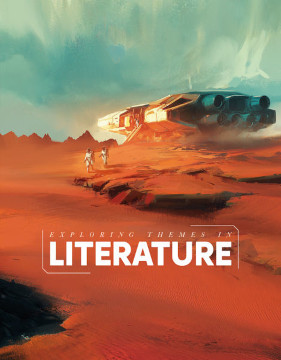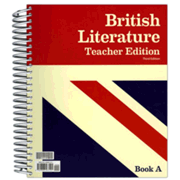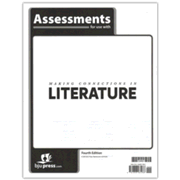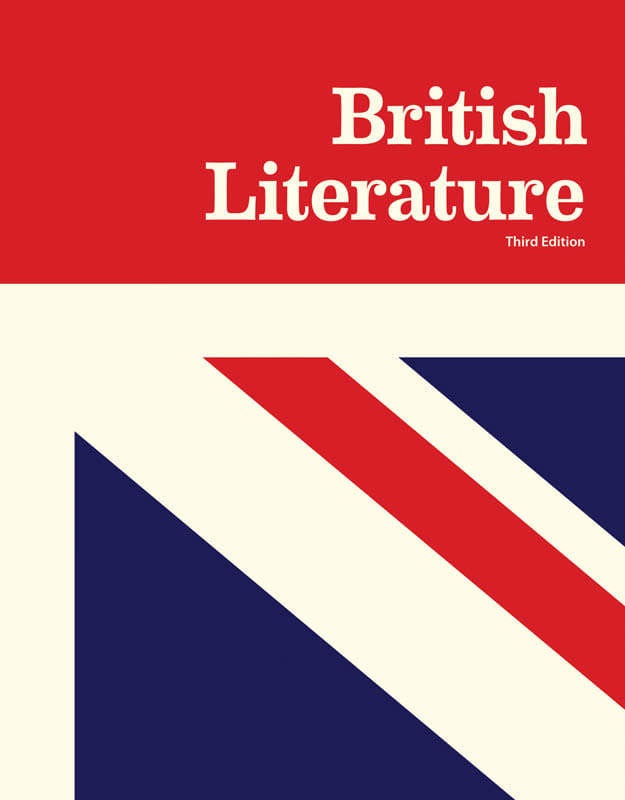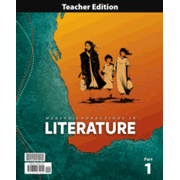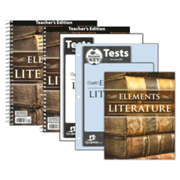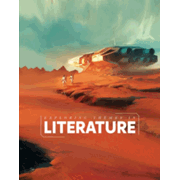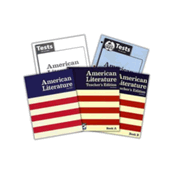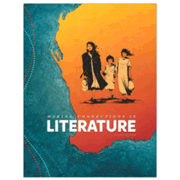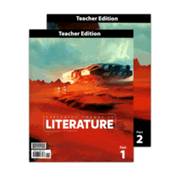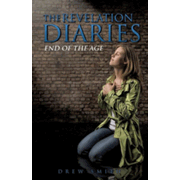Not all literature courses are created equal. Some seem to have selected reading material to meet multicultural or social goals rather than as examples of good literature. Others seem to focus on simple comprehension questions (e.g., identify the protagonist and the antagonist) and never get into meaty discussion questions that really engage students.
The BJU Press series for grades seven through twelve does a great job on both literary selections and worthwhile questions, especially if you are interested in developing a strong Christian worldview in your students. Courses in the series for grades seven through twelve are Exploring Themes in Literature, Excursions in Literature, Fundamentals of Literature, Elements of Literature, American Literature, and British Literature.
They feature an interesting mix of reading material. Many reading selections authored by non-Christians are included, both for their literary value and to help students learn how to identify different perspectives authors bring to their works. However, literary analysis and enjoyment are taught from a Protestant perspective; so much so in American Literature and British Literature that those with other religious beliefs will have trouble with some of the selected readings, discussion questions, and the Scriptural Application part of the lessons presented in the teacher editions. Application sections at all levels almost always relate the reading selection to biblical ideas or principles.
One of the main purposes of this series is to help students progress beyond reading simply for pleasure to enjoying reading for inspiration and wisdom. Discussion questions are one of the primary tools used to make that happen.
The discussion questions are particularly good in this series, and they can be used for either oral discussion or writing assignments. The courses teach literary analysis, helping students recognize the literary elements at work in a piece of literature and grasp the fundamentals of critical interpretation. For instance, in Exploring Themes in Literature for seventh grade, students read "The Strangers that Came to Town," and then answer a series of questions. Three of those questions focus on justice. The first question asks what the author communicates about justice. The second question asks students whether the author effectively communicated that message (and why or why not). The third question has students compare the author's message with three passages from the Bible. The critical thinking questions gradually become more challenging. For example, the American Literature textbook for eleventh grade includes a short story “The Minister’s Black Veil” by Nathaniel Hawthorne. Among the discussion questions are the following: “In your opinion, does Hooper’s self-imposed isolation represent self-denial for the edification of others, or is it symbolic of misdirected religious zeal? Discuss Hawthorne’s theme in light of I John 1:8-10” (p. 254).
Parents and teachers need to be familiar with the readings so they can lead discussions. While students can do a certain amount of work independently, parents will need to invest some time preparing for each lesson. Teacher editions provide background, analysis, and suggested answers, so even teachers without a background in literature can teach these courses. As with all literature anthologies, parents and teachers are not expected to use every selection. Choose some from each section to fit your own goals and schedule.
Each course includes a student text and a two-volume, spiral-bound teacher edition. Teacher editions have images of reduced student pages. Valuable teaching information is below the images of student pages and in the side margins. Also, words, sentences, or paragraphs in the reduced student pages of the teacher’s edition are highlighted in different colors to match corresponding colored margin notes for the teacher. These highlighted sections can indicate a point of discussion, a definition, an example of a literary element, or a cross-reference.
Some teacher editions provide reproducible, supplemental activity pages and teaching helps at the back of the books. Teacher editions for Elements and American Literature include a Teacher’s Toolkit CD-ROM (inside the back cover) with teacher support materials, such as worksheets, graphic organizers, reading quizzes, writing rubrics, and standardized test practice in reading and vocabulary. Resources like these for the other courses can be accessed at the BJU Press's Homeschool Hub.
Tests and answer keys for each course can be ordered separately, but subject kits for all courses include tests and answer keys along with a student text and the teacher edition.
Exploring Themes in Literature, Fifth Edition
The fifth edition of Exploring Themes in Literature has been significantly revised from the fourth edition. This course for seventh grade has units corresponding to the themes of love, community, transformation, justice, perseverance, and purpose. Students learn to analyze literary works and evaluate them in light of a biblical worldview.
The course features a broader assortment of genres than did the previous edition. In addition to short stories, excerpts from novels, poetry, autobiographies, and memoirs, this new edition adds folk tales, myths, fantasies, a comic strip, biblical narratives, a coming-of-age story, and science fiction. It has also added non-fiction pieces such as an interview, narrative non-fiction, an opinion piece, speeches, informational texts, and a persuasive essay. This course has different writing assignments than did the previous edition, and oral presentations (from the teacher edition) have been added to most units.
Selections are by a diverse range of authors, such as Joan Aiken, James Thurber, Li-Young Lee, Ray Bradbury, Anton Chekhov, Mildred D. Taylor, and Rudyard Kipling.
A novel study of The Last Battle by C.S. Lewis is presented in the teacher edition. You need to obtain the novel for this study.
Making Connections in Literature, Fourth Edition
The unifying theme of this eighth-grade text is the idea of reading literature to make connections between important ideas. Units are titled Maturity, Wisdom, Generosity, Freedom, and Nature. Some authors and writings (or excerpts) included are Ben-Hur by Lew Wallace, Little Women by Louisa May Alcott, A Christmas Carol by Charles Dickens, The Lost Princess by George MacDonald, and "Letter from Frederick Douglass." The teacher edition includes directions for the study of the novel Across Five Aprils, but students need to obtain the novel on their own.
Literary works are preceded by "Before Reading sections." Occasional questions are posed in sidebars and should be considered at those points. Think & Discuss questions follow each reading. Some composition assignments are built into the student text. Vocabulary words with definitions are in footnotes in the student text.
Each unit has a review in the student textbook. Reviews are tests that include multiple-choice, true/false, matching, and short-answer questions, along with one or two essay questions.
Lessons in the teacher edition provide background, objectives, "Biblical Worldview Shaping" topics to discuss based on the reading, an engagement activity to grab students' attention, instructional material, help with literary analysis, applications, and additional activities.
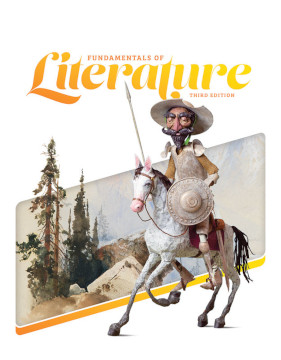 Fundamentals of Literature, Third Edition
Fundamentals of Literature, Third Edition
Suggested for grade nine, Fundamentals of Literature is the foundation for the study of literature throughout high school. Each unit focuses on one theme and one literary element. Themes for the units are endurance, discernment, hope, influence, identity, and death and the end. The literary elements that are the focus of each unit are conflict, character, theme, point of view, structure, and tone.
Students read from many genres, including novels, poetry, drama, ballads, memoirs, biographies, autobiographies, short stories, letters, hymns, folktales, myths, graphic novels, speeches, and essays. In addition to some excerpts from the Bible, examples of just a few of the written works (or excerpts) included are The Odyssey by Homer, Confessions by Augustine of Hippo, "The Gift of the Magi" by O. Henry, David Copperfield by Charles Dickens, Julius Caesar by William Shakespeare, "Ballad of Birmingham" by Dudley Randall, and "Letter to My Younger Self" by James Brown. Students also read a 1963 newspaper article titled "Black Church Bombed in Birmingham, Alabama," and the entire play Cyrano de Bergerac by Edmond Rostand.
I especially appreciate the lessons that take into account the formats for literature that students actually read, such as the lesson on Don Quixote by Miguel de Cervantes that has students read and compare excerpts from both a graphic novel and a traditional translation. In addition, some lessons include listening, viewing, or speaking activities.
This third edition of Fundamentals of Literature differs significantly from the second edition. Many of the reading selections are different, and the textbook's new artwork is used as the basis for brief lessons in visual analysis. Instruction for the relatively frequent writing assignments is presented from the teacher editions. Development of a biblical worldview receives even more attention, with specific worldview outcomes listed alongside educational outcomes. "The Big Question," posed under the title of each literary work at the beginning of each lesson, is used to address a worldview belief or attitude. For example, "The Big Question" for "The Gift of the Magi" asks, "How important are material possessions in a relationship?"
Elements of Literature, Second Edition
Elements of Literature, suggested for tenth grade, teaches literary analysis at a more challenging level than does Fundamentals of Literature. It delves into topics such as imaginative comparison, sound and syntax, allusion and symbol, and irony through literary selections from genres such as fiction, poetry, biography, and drama. Shakespeare’s Romeo and Juliet is included for study within the text. You might want to use the optional DVD of selected scenes from a BJU Press production of Romeo and Juliet. The DVD also has the director’s explanations of what has happened leading up to each scene.
American Literature, Third Edition
This text, written for eleventh grade, covers American literature from the colonial period up into the twenty-first century. Representative authors are William Bradford, Benjamin Franklin, Nathaniel Hawthorne, Henry David Thoreau, Herman Melville, James Thurber, Thornton Wilder, and Amy Tan. Selections are organized by historical literary periods while addressing some of the philosophical movements that influenced literature. There is significant discussion of the worldviews reflected by authors and their works.
This edition has expanded its inclusion of American subcultures with several prose pieces, such as an excerpt from "How the Word Began" from the Iroquois Confederacy, "How It Feels to Be Colored Me" by Zora Neale Hurston, and "Two Kinds" by Amy Tan. Similarly, poems representing diverse cultures are included, such as "Dream Variations" by Langston Hughes, "If We Must Die" by Claude McKay, "Rosa" by Rita Dove, and "Eating Alone" by Li-Young Lee.
Brief writing assignments are presented throughout the textbook, and there are six major writing lessons: narrative essay, persuasive essay, short story, historical report, poetry, and literary analysis essay.
British Literature, Third Edition
This twelfth-grade course covers British literary periods from the Middle Ages to the present. Selections are often chosen to illustrate philosophical and cultural issues from various perspectives. Religious developments receive far more attention here than they do in secular British literature texts. Representative authors include Edmund Spenser, Geoffrey Chaucer, Thomas More, John Milton, Ben Jonson, Jonathan Swift, Mary Wollstonecraft, Robert Browning, Oscar Wilde, Rudyard Kipling, Virginia Woolf, and Seamus Heaney. Shakespeare's play Macbeth is also included for study. An optional DVD of Macbeth is available.





